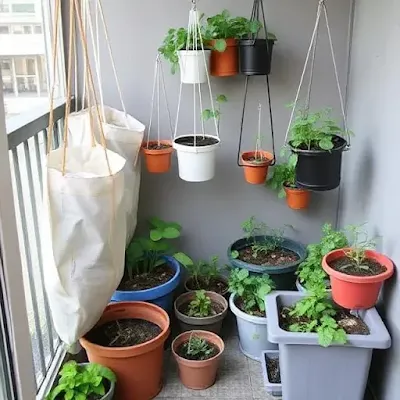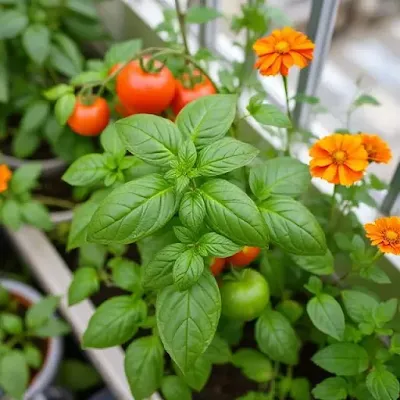Why Balcony Gardening Is a Game-Changer
You don’t need acres of land to grow your own herbs, veggies, or flowers. In fact, all you need is a balcony with sunlight and a few pots to get started.
I started my balcony garden with just three containers and a basil plant. Within a few weeks, I had cherry tomatoes, mint, and even a few marigolds blooming outside my sliding door.
This guide walks you through the step-by-step process to start your own balcony garden — no experience needed.
Step 1: Check Your Balcony Conditions
Before you plant anything, take a few minutes to assess your space:
Sunlight
How many hours of sun does your balcony get?
- 6+ hours = perfect for veggies (full sun)
- 3–6 hours = good for herbs and some flowers (partial sun)
- Less than 3 = grow leafy greens or shade plants
Wind
- Balconies get windier than gardens — use windbreaks or heavier pots
Water Source
- Is there a tap nearby? If not, keep a watering can ready inside.
Step 2: Choose the Right Containers
Your containers will be the foundation of your garden. Make sure:
- They have drainage holes
- They’re the right size (deeper for tomatoes, shallow for lettuce)
- They fit your balcony weight limits (use plastic or fabric if heavy pots aren’t allowed)
Container Ideas:
- Plastic pots
- Grow bags
- Hanging baskets
- Vertical planters
- Wooden crates or DIY planters
Tip: Put a saucer underneath each pot to protect your balcony floor.
Step 3: Pick the Right Plants
Best Balcony Veggies:
- Cherry tomatoes – grow vertically, need full sun
- Peppers – compact and colorful
- Lettuce & spinach – grows fast in partial shade
- Radishes – great for shallow pots
Easy Balcony Herbs:
- Basil
- Mint
- Parsley
- Chives
- Oregano
Balcony-Friendly Flowers:
- Marigolds
- Petunias
- Nasturtiums
- Calendula
Start small with 2–3 types of plants and expand as you learn what works.
Step 4: Use Quality Soil & Fertilizer
Never use garden soil in containers — it’s too dense and can cause drainage problems.
Use:
- Potting mix (lightweight, drains well)
- Compost for nutrients
- Slow-release organic fertilizer or liquid feed every 2–3 weeks
If you’ve read our Beginner's Guide to Composting, this is a great time to use your compost!
Step 5: Water the Right Way
Balcony pots dry out faster, especially in summer.
Watering Tips:
- Check soil moisture daily
- Water early morning or late evening
- Use a small watering can or bottle for tight spaces
- Group plants together to create micro-humidity
Alt tag: “Person watering potted herbs and vegetables on a city balcony”
Step 6: Maintain, Harvest, and Enjoy
Daily Care:
- Remove yellow leaves
- Check for pests (aphids, whiteflies)
- Pinch herbs to encourage growth
Harvesting:
- Pick tomatoes when fully red
- Snip herbs often — they grow better when trimmed
- Don’t be afraid to try, fail, and replant!
Want to grow herbs indoors too? Check out our guide on Growing Herbs Inside Without Sunlight.
For more urban gardening ideas, visit Toronto Master Gardeners – Gardening in Containers, a trusted Canadian resource for balcony and patio planting tips.
Final Thoughts
A balcony garden is more than just a hobby — it’s a way to create beauty, grow your own food, and connect with nature in the middle of the city.
Even a tiny balcony or fire escape can hold a few pots of joy. So don’t overthink it — pick up a few containers, get some potting soil, and start planting today.
Your future self (and your tomatoes) will thank you.





